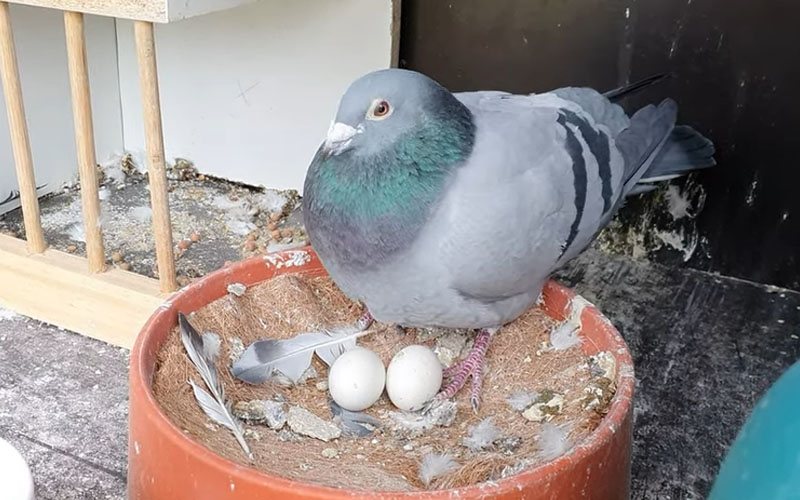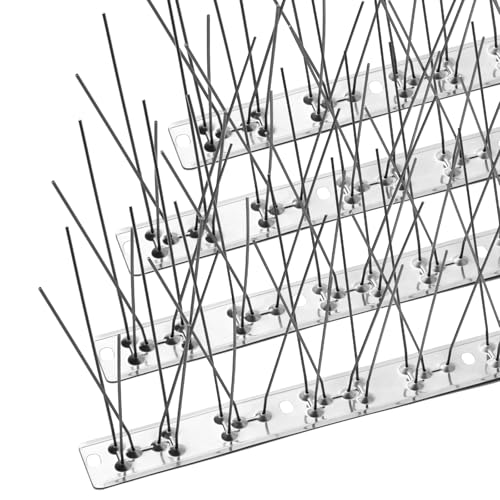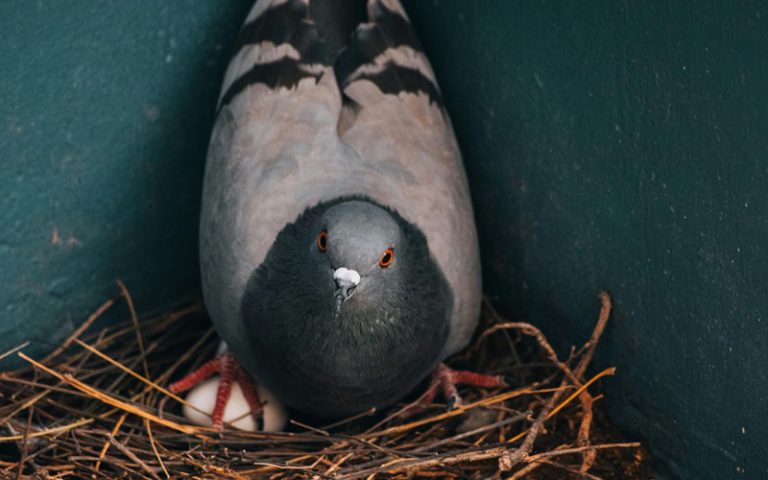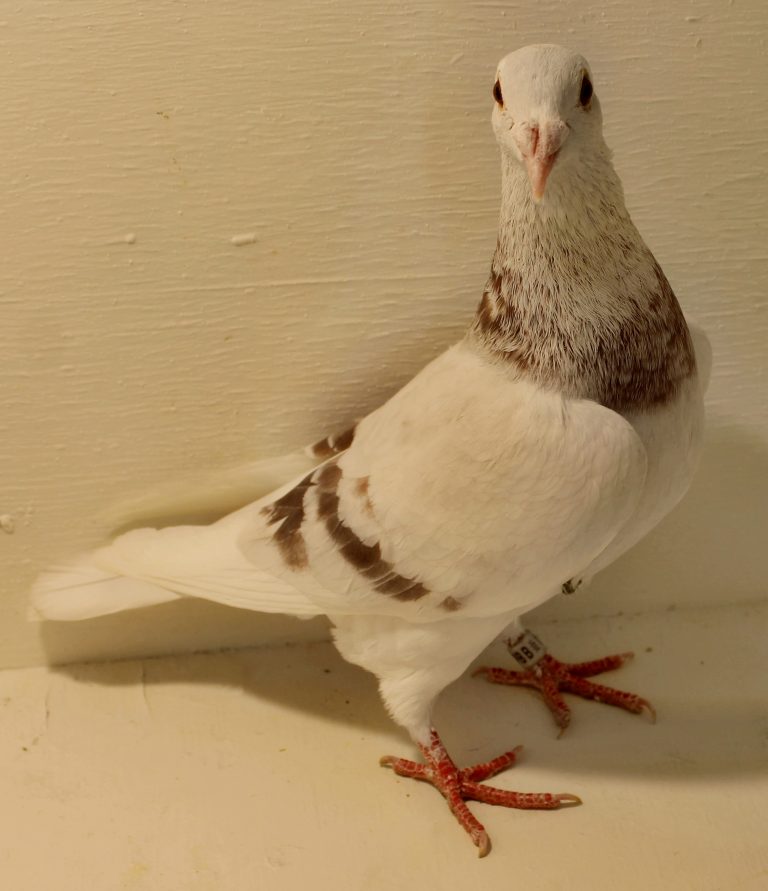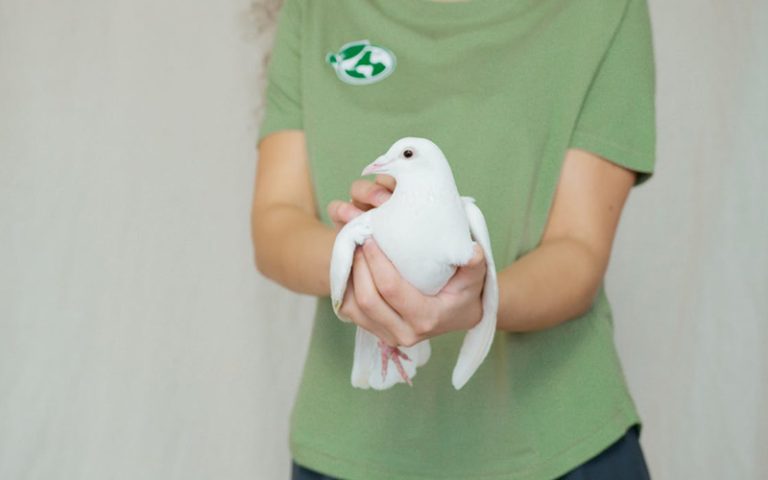How Long Does It Take for Pigeon Eggs to Hatch?
Pigeon egg incubation refers to the process where adult pigeons, with remarkable precision, provide the necessary warmth and care to eggs, ensuring the development of the embryos within.
Pigeon eggs play a pivotal role in the continuity of their species. The incubation process is a crucial step in the lifecycle, ensuring the survival of the next generation.
The incubation period marks the transition from egg to chick, setting the stage for the fledgling pigeons’ entrance into the world. So, the question is: how long do pigeon eggs take to hatch?
Pigeon eggs typically take about 17 to 19 days to hatch. During this time, the parent pigeons take turns incubating the eggs. The process begins once the eggs are laid, and the parents keep them warm until the chicks break through the shells. This natural incubation period ensures the development of healthy pigeon chicks.
Pigeon Egg Incubation Process:
The pigeon egg incubation process is a fascinating journey of warmth and care, orchestrated by both male and female pigeons. It all begins when the female pigeon lays her eggs in a carefully crafted nest, where the embryos are nestled snugly within the protective shell.
Once the eggs are laid, both parents take turns sitting on the eggs, using their bodies to provide the essential warmth needed for incubation. This constant warmth is vital for the development of the embryos inside the eggs.
During this time, the pigeon parents exhibit remarkable dedication, rotating shifts to ensure that the eggs are never left unattended for too long. This shared responsibility highlights the strong bond between the pigeon pair and their commitment to the next generation.
As the days pass, the eggs undergo subtle changes, signaling the progression of the incubation process. Observant caretakers may notice slight movements within the eggs, indicating the development of the embryos.
Throughout the incubation period, the pigeon parents diligently tend to the nest, adjusting their positions to maintain optimal warmth and humidity levels. Their unwavering dedication ensures the embryos receive the care they need to thrive.
3 Factors Influencing Incubation Time
Pigeon egg incubation entails negotiating a slew of factors that greatly determine how long it takes for these delicate eggs to hatch.
1. Temperature and Humidity
One of the primary factors influencing incubation time is the delicate balance of temperature and humidity within the nest. Pigeons meticulously regulate these environmental conditions to create an optimal atmosphere for embryo development. Deviations from the ideal range can either expedite or prolong the incubation period. The attentive management of these factors showcases the remarkable adaptation and instinctual knowledge possessed by pigeon parents.
2. Genetic Variations
The genetic makeup of individual pigeon pairs contributes to the variability in incubation times. Just as in human biology, the unique combination of genes between male and female pigeons can impact the developmental pace of the embryos. This adds a layer of complexity to the incubation process, highlighting the diversity within pigeon populations.
3. Environmental Conditions
Pigeons, being attentive and protective parents, consider external factors when determining the appropriate time for hatching. Environmental conditions, such as potential threats or disturbances, play a crucial role in influencing the decision to proceed with incubation or delay it for safety reasons. This adaptive behavior showcases the instinctual intelligence of pigeons in ensuring the survival of their offspring.
# Normal Incubation Period
Pigeon egg incubation reveals the complexities of the natural incubation process. This phase, marked by anticipation and wonder, plays a vital role in the development of pigeon embryos.
Duration in Days
The typical incubation period for pigeon eggs spans an awe-inspiring 17 to 19 days. This window, although seemingly brief, encapsulates a world of transformative growth within the confines of the eggshell. The countdown to hatching commences with the diligent care of pigeon parents who take turns to ensure a constant and optimal environment for their precious cargo.
Observing Behavioral Changes
As the days progress, keen observers may notice subtle yet significant behavioral changes in the pigeon pair. There’s a heightened sense of commitment, with both parents exhibiting increased attention to the nest. Their careful rotations and shared responsibility underscore the synchronized dance of nature.
Pigeon Parental Shifts
Understanding the dynamics of parental shifts during this period is akin to witnessing a carefully choreographed performance. Pigeon parents seamlessly exchange roles, ensuring that the eggs receive continuous warmth and protection. This harmonious collaboration sets the stage for the upcoming momentous event – the hatching of pigeon chicks.
# Signs of Imminent Hatching
The anticipation of new life during the incubation period builds, and there are distinctive signs that indicate the imminent hatching of pigeon eggs. These moments, filled with excitement and wonder, provide observers with a glimpse into the miraculous transformation taking place inside the eggs.
- Egg Candling: One of the first signs is egg candling, a gentle and non-intrusive method where a light source is used to illuminate the egg’s interior. This process reveals shadows and outlines, allowing keen observers to witness the developing embryo. As the hatch date approaches, subtle changes become more evident, heightening the excitement.
- Audible Chirping: As the tiny occupants inside the eggs grow, they start emitting faint chirping sounds. These delicate melodies, barely audible to the human ear, resonate with the promise of new life. Pigeon parents, attuned to these sounds, become increasingly vigilant, a testament to the instinctual connection they share with their unborn chicks.
- Pigeon Parental Behavior: Perhaps the most heartwarming sign is the shift in parental behavior. Pigeon parents, sensing the imminent arrival of their offspring, exhibit heightened protective instincts. They become more watchful, frequently checking the eggs, and may even adjust their position to create a more nurturing environment.
# Possible Delays in Hatching
Pigeon egg hatching, although a natural process, can sometimes face delays due to various factors. Knowing these potential delays is crucial for pigeon enthusiasts and breeders alike.
1. External Disturbances
One common reason for delays in hatching is external disturbances. Pigeon pairs are highly sensitive to their surroundings, and any perceived threat can lead them to delay the hatching process. This sensitivity is an evolutionary trait designed to ensure the safety of their offspring. For example, if the nest is located in an area with high human activity or frequent disturbances from other animals, such as predators or competing birds. The pigeon pair may postpone hatching until they feel the environment is safe and secure.
2. Health of Pigeon Pair
The overall health and condition of the pigeon pair can also impact the hatching process. Pigeons that are stressed or in poor health may not provide optimal care during incubation, leading to delays in hatching. Inadequate nutrition, disease, or injuries can all contribute to this delay. Additionally, older pigeon pairs may experience longer incubation periods compared to younger, healthier pairs.
3. Unfavorable Weather Conditions
Weather conditions play a significant role in pigeon egg incubation. Sudden changes in temperature, extreme heat or cold, and inclement weather such as heavy rain or storms can all influence the hatching process. Pigeon pairs may delay hatching during unfavorable weather conditions to protect their eggs and ensure the survival of their offspring. This natural instinct to prioritize the safety of their young demonstrates the remarkable adaptability and resilience of pigeons in the face of environmental challenges.
# Ensuring Successful Hatching
In the delicate process of pigeon egg incubation, ensuring successful hatching requires meticulous attention and proactive measures. Pigeon parents play a pivotal role in providing a conducive environment for the embryos to develop into healthy chicks.
Providing Adequate Resources
Central to a successful hatching is the availability of ample resources for the pigeon pair. Adequate food supply ensures the parents maintain optimal health, crucial for sustaining the demanding incubation period. A well-nourished pair is better equipped to transfer essential nutrients to the developing embryos, fostering robust growth.
Monitoring Nest Conditions
Regular monitoring of nest conditions is paramount. Pigeon parents demonstrate an innate ability to regulate temperature and humidity within the nest. Observers, however, can assist by ensuring the nest remains undisturbed and well-insulated. This involves shielding the nest from extreme weather conditions and potential disturbances, creating a tranquil haven for the developing embryos.
Intervention When Necessary
Despite nature’s remarkable design, there are instances where gentle intervention becomes necessary. This may include providing supplemental warmth during unexpected temperature drops or addressing external disturbances that could disrupt the incubation process. While intervention should be minimal, it underscores the commitment to ensuring the well-being of both the pigeon pair and the soon-to-hatch chicks.
What to Do If Pigeon Eggs Don’t Hatch on Time?
If pigeon eggs don’t hatch on time, there could be various reasons for the delay. Here are some steps you can take:
- Patience: Pigeon eggs usually take around 17 to 19 days to hatch. If it has been less than this timeframe, give the eggs more time before intervening.
- Check for Viability: If it has been more than 19 days and the eggs haven’t hatched, you may want to check the viability of the eggs. Gently candle the eggs by shining a light through them in a dark room. Look for signs of development, such as blood vessels or movement. If you don’t see any signs of life, the eggs may not be viable.
- Temperature and Humidity: Ensure that the incubation conditions are optimal. Pigeon eggs need a consistent temperature between 99-100°F (37-38°C) and a humidity level of around 55-60%. Fluctuations in temperature and humidity can affect the hatching process.
- Turning the Eggs: If the eggs are not turned regularly during incubation, the embryos may not develop properly. Make sure the eggs are turned at least three to four times a day until a day or two before hatching.
- Nesting Material: Ensure that the nesting material is appropriate and that the nesting area is clean. Contaminated or dirty nesting material can lead to unsuccessful hatching.
- Health of the Parents: The health of the parent pigeons is crucial. Ensure that they are receiving proper nutrition and are free from any diseases.
Can You Move Pigeon Eggs During Incubation?
It’s not advisable to relocate pigeon eggs once they’ve begun incubating. Moving them can disturb the nesting process, potentially harming the developing chicks inside. It’s best to let the parent pigeons handle the incubation duties without interference. Any disruptions may lead to unsuccessful hatching or stressed parents. Leave the eggs for a successful and healthy nesting experience.
How Many Eggs Does a Pigeon Lay in a Month?
A pigeon typically lays one to two eggs per month. Pigeons are not prolific egg layers compared to some other birds. They prefer smaller clutches, focusing on nurturing the few eggs they lay. This reproductive behavior ensures that the parent pigeons can adequately care for and raise their offspring, promoting the well-being of the next generation.
FAQ
Bird eggs typically take about 10 to 20 days to hatch, depending on the species. The duration varies, but most eggs hatch within this timeframe. Temperature and nesting conditions play a crucial role in the hatching process. Warmer climates tend to expedite the process, while cooler temperatures may prolong it. Keep in mind that different bird species have unique incubation periods, so the time it takes for eggs to hatch can vary.
A baby pigeon typically takes about 30 days to learn how to fly. During this time, it undergoes rapid growth and development, gradually gaining the strength and skills needed for flight. So, in about a month, a young pigeon goes from being a hatchling to taking its first flight.
Pigeons typically lay eggs in the months of spring, such as March or April. During this time, they actively build nests and lay their eggs, with a peak in reproductive activity. The warmer weather and increased food availability contribute to the ideal conditions for pigeon egg-laying.
Pigeons typically spend about 17 to 19 days incubating their eggs. During this time, the parent pigeons take turns sitting on the eggs to keep them warm. This cozy nesting period ensures the eggs develop properly, eventually hatching into chicks.

